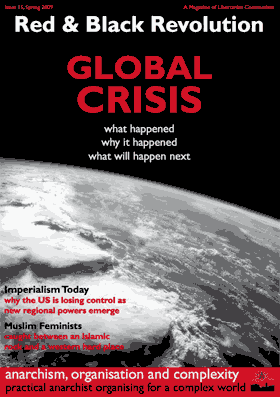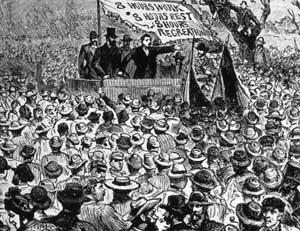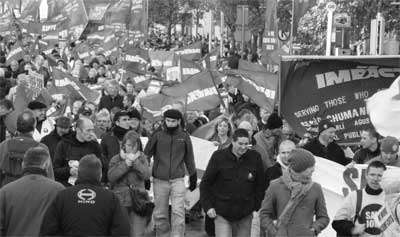Over 30 years of anarchist writing from Ireland listed under hundreds of topics
Magazine
WSM’s Organisational Structures
This article from Red & Black Revolution 15 describes and explains the internal organizational structure of the WSM as it was in 2008. See the WSM Constitution to get an idea of any changes that may have been made since. This article was originally a box in the article Practical Anarchist Organising.
Practical Anarchist Organising - the WSM as a case study
Over the last few years, the Workers Solidarity Movement, the anarchist organisation that publishes this magazine, has grown considerably. We went from being an organisation with only a dozen members or so, to an organisation six times that size. As part of that growth we have had to reassess our internal workings and devise a range of new processes and structures for communicating, coordinating and democratic decision making. This article describes this process of change. It is hoped that it may serve as a useful case-study for other groups facing similar problems and as a small demonstration of the how anarchist organisational principles can be applied in practice.
Imperialism Today and the Emergence of Regional Powers
 This articles charts the course of global geo-politics since the end of the Cold War, the emergence of new regional powers and the recurring cycle of crises in neoliberal capitalism that culminated in the great financial crisis of 2008.
This articles charts the course of global geo-politics since the end of the Cold War, the emergence of new regional powers and the recurring cycle of crises in neoliberal capitalism that culminated in the great financial crisis of 2008.
The historical development of the global financial order under US hegemony
 This article tells the story of the historical development of the regime of global financial order under US hegemony. It begins by examining how the centre of capital accumulation shifted from Europe to the US in the first half of the twentieth century, and how following World War II the global financial order became centred around the US through the Bretton Woods system. It then looks at how the Bretton Woods System was undermined, concentrating as much on the role of workers militancy as on the role of the Eurodollars market. After considering the response to the crisis of Bretton Woods, it concludes by looking at the Clinton boom, bringing us up to the current situation of the US’s current heavy dependence on foreign borrowing
This article tells the story of the historical development of the regime of global financial order under US hegemony. It begins by examining how the centre of capital accumulation shifted from Europe to the US in the first half of the twentieth century, and how following World War II the global financial order became centred around the US through the Bretton Woods system. It then looks at how the Bretton Woods System was undermined, concentrating as much on the role of workers militancy as on the role of the Eurodollars market. After considering the response to the crisis of Bretton Woods, it concludes by looking at the Clinton boom, bringing us up to the current situation of the US’s current heavy dependence on foreign borrowing
Global Political Repercussions of the capitalist crisis
As soon as the scale of the crisis became clear, all rhetoric about free-markets and competition vanished. Bankers, capitalists and right wing politicians were all suddenly huge believers in the role of the state and the importance of regulation.
The development of the capitalist crisis 2008 to 2009
The first 18 months of the crash from the Credit Crunch to the spread to the 'real economy.
Red & Black Revolution 15
 This is the Spring 2009 issue of Ireland's anarchist magazine Red Black Revolution, issue 15. You can read the articles online or download the PDF file.
This is the Spring 2009 issue of Ireland's anarchist magazine Red Black Revolution, issue 15. You can read the articles online or download the PDF file.
Black Flame and the anarchist tradition - review
 This new history of anarchism provides a thorough and approachable examination of the tradition’s key ideas, debates and strategies, placing them in the context of the social struggles in which they arose. Anarchism is not blessed with the most attractive of brand names. While dictionaries and news media alike have successfully associated it with disorder and chaos, the anarchist political pantheon itself seems to share these traits; anarchism is label to both capitalists and communists, radical individualists and revolutionary socialists.What can ‘anarcho-capitalists’ such as Murray Rothbard have in common with revolutionaries such as Mikhail Bakunin and Piotr Kropotkin? Even the latter, among the most important of the movement’s theorists, himself claimed that anarchism’s political pedigree stretched back as far as Ancient Greek philosopher Xeno and Lao Tzu, the originator of Taoism. If one tries to and accommodate such a diversity of personas under this single term, the word loses all meaning.
This new history of anarchism provides a thorough and approachable examination of the tradition’s key ideas, debates and strategies, placing them in the context of the social struggles in which they arose. Anarchism is not blessed with the most attractive of brand names. While dictionaries and news media alike have successfully associated it with disorder and chaos, the anarchist political pantheon itself seems to share these traits; anarchism is label to both capitalists and communists, radical individualists and revolutionary socialists.What can ‘anarcho-capitalists’ such as Murray Rothbard have in common with revolutionaries such as Mikhail Bakunin and Piotr Kropotkin? Even the latter, among the most important of the movement’s theorists, himself claimed that anarchism’s political pedigree stretched back as far as Ancient Greek philosopher Xeno and Lao Tzu, the originator of Taoism. If one tries to and accommodate such a diversity of personas under this single term, the word loses all meaning.
Union Resistance and the Leadership of Ideas
 Andrew Flood’s article “Capitalist crisis and union resistance in Ireland” (IAR 1) calls for a “debate on where we should put our energy”. This is a contribution to that debate. Andrew outlines the framework of the economic crisis and the balance of forces as the Irish workers’ movement attempts to respond to attacks by the bosses and their state. While the exact details of the government’s December budget are currently unclear, doubtless it will once again involve a massive attack on the living standards of working people.
Andrew Flood’s article “Capitalist crisis and union resistance in Ireland” (IAR 1) calls for a “debate on where we should put our energy”. This is a contribution to that debate. Andrew outlines the framework of the economic crisis and the balance of forces as the Irish workers’ movement attempts to respond to attacks by the bosses and their state. While the exact details of the government’s December budget are currently unclear, doubtless it will once again involve a massive attack on the living standards of working people.
The scientific case against inequality - review of The Spirit Level
 We all want a better world, but is it possible? The recently published book The Spirit Level joins a growing body of evidence for the viability of a better world.
We all want a better world, but is it possible? The recently published book The Spirit Level joins a growing body of evidence for the viability of a better world.

